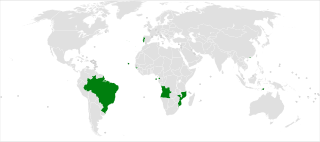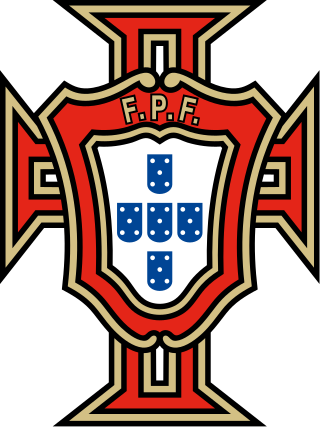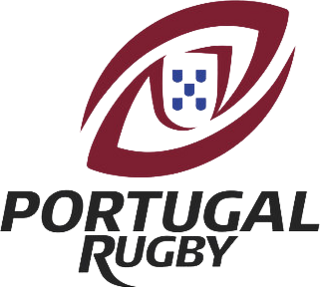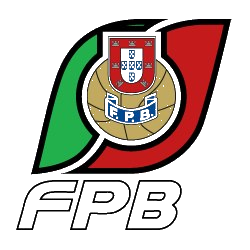| |||||
| Decades: | |||||
|---|---|---|---|---|---|
| See also: | List of years in Portugal | ||||
Events in the year 1139 in Portugal .
| |||||
| Decades: | |||||
|---|---|---|---|---|---|
| See also: | List of years in Portugal | ||||
Events in the year 1139 in Portugal .

Portugal, officially the Portuguese Republic, is a country located on the Iberian Peninsula, in Southwestern Europe, and whose territory also includes the Macaronesian archipelagos of the Azores and Madeira. It features the westernmost point in continental Europe, its mainland west and south border with the North Atlantic Ocean and in the north and east, the Portugal-Spain border constitutes the longest uninterrupted border-line in the European Union. Its archipelagos form two autonomous regions with their own regional governments. In the mainland, Alentejo region occupies the biggest area but is one of the regions in Europe with a lower population density. Lisbon is the capital and largest city by population, being also the main spot for tourists alongside Porto and Algarve.

Portuguese is a Western Romance language of the Indo-European language family, originating in the Iberian Peninsula of Europe. It is the official language of Portugal, Brazil, Cape Verde, Angola, Mozambique, Guinea-Bissau and São Tomé and Príncipe, while having co-official language status in East Timor, Equatorial Guinea, and Macau. Portuguese-speaking people or nations are "Lusophones". As the result of expansion during colonial times, a cultural presence of Portuguese speakers is also found around the world. Portuguese is part of the Ibero-Romance group that evolved from several dialects of Vulgar Latin in the medieval Kingdom of Galicia and the County of Portugal, and has kept some Celtic phonology.

The Romance languages, also known as the Latin or Neo-Latin languages, are the languages that are directly descended from Vulgar Latin. They are the only extant subgroup of the Italic branch of the Indo-European language family.

Sport Lisboa e Benfica, commonly known as Benfica, is a professional football club based in Lisbon, Portugal, that competes in the Primeira Liga, the top flight of Portuguese football, where they are the current champions.

The Portugal national football team has represented Portugal in men's international football competition since 1921. The national team is controlled by the Portuguese Football Federation (FPF), the governing body for football in Portugal. Portugal's home matches are played at various stadiums throughout Portugal, and its primary training ground and technical headquarters, Cidade do Futebol, is located in Oeiras. The head coach of the team is Roberto Martínez, and the captain is Cristiano Ronaldo, who also holds the team records for most caps and most goals.

The Iberian Union was the dynastic union of Spain and Portugal, and of their respective colonial empires, that existed between 1580 and 1640 and brought the entire Iberian Peninsula except Andorra, as well as Portuguese and Spanish overseas possessions, under the Spanish Habsburg monarchs Philip II, Philip III, and Philip IV. The union began after the Portuguese crisis of succession and the ensuing War of the Portuguese Succession, and lasted until the Portuguese Restoration War, during which the House of Braganza was established as Portugal's new ruling dynasty with the acclamation of John IV as the new King of Portugal.
Judaeo-Portuguese, Jewish-Portuguese or Judaeo-Lusitanic, is an extinct Jewish language or a dialect of Galician-Portuguese written in the Hebrew alphabet that was used by the Jews of Portugal.

The Treaty of Windsor is a diplomatic alliance signed between Portugal and England on 9 May 1386 in Windsor and sealed by the marriage of King John I of Portugal to Philippa of Lancaster, daughter of John of Gaunt, 1st Duke of Lancaster. With the victory at the Battle of Aljubarrota, assisted by English archers, John I was recognised as the undisputed King of Portugal, putting an end to the interregnum of the 1383–1385 Crisis. The Treaty of Windsor established a pact of mutual support between the countries.
Bidau Creole Portuguese was a Portuguese-based creole language that was spoken in Bidau, Nain Feto, an eastern suburb of Dili, East Timor.

Portuguese chicken, also known as Portuguese-style chicken or galinha à portuguesa is a dish found in Macanese cuisine.

The Angolan Football Federation is the governing body of football in Angola. It was founded in 1979, and affiliated to FIFA and to CAF in 1980. It organizes the national football league Girabola and the national team.

The Portuguese Rugby Federation is the governing body for rugby union in Portugal. It was founded in 1926 and became affiliated to the International Rugby Board in 1988. The Portuguese Rugby Federation organises the main rugby union championship of Portugal, the Campeonato Nacional de Rugby, and oversees the country's national teams—men's and women's, age-grade teams, and sevens teams for both men and women.

The Liga Portugal, also known by its acronym LPFP, is a governing body that manages professional football club competitions in Portugal. It was founded in 1978 as Liga Portuguesa dos Clubes de Futebol Profissional and works as an autonomous organism under the authority of the Portuguese Football Federation. In 1991, it changed its name to Liga Portuguesa de Futebol Professional and in the year 2020, changed the name into the current one.
Portuguese Sign language is a sign language used mainly by deaf people in Portugal.

The Portuguese Basketball Federation is the governing body for basketball in Portugal. Established on 17 August 1927, it became one of the eight founding national member federations of FIBA in 1932.
The Portugal national under-16 football team is the association football team that represents the nation of Portugal at the under-16 level.
The Portugal national under-18 football team is the association football team that represents the nation of Portugal at the under-18 level.

Alberto da Costa e Silva was a Brazilian historian, poet, and diplomat. He won the 2014 Camões Prize.

The intermunicipal community is a type of administrative division in Portugal. Since the 2013 local government reform, there are 21 intermunicipal communities. They replaced the urban communities, the intermunicipal communities for general purposes and some metropolitan areas that were created in 2003, and abolished in 2008. The territories of the intermunicipal communities are the basis of the NUTS III statistical regions.

Shrimp curry, also known as prawn curry, is a typical curry dish of Burmese cuisine, Indonesian cuisine in Indonesia, Indo-Portuguese cuisine in India (Goa) and Portugal, Mozambican cuisine in Mozambique and Thai cuisine in Thailand (Phuket).